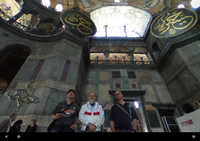Sermon for September 24th, 2017
Proverbs 3:19-35
19 The Lord by wisdom founded the earth;
by understanding he established the heavens;
20 by his knowledge the deeps broke open,
and the clouds drop down the dew.
21 My child, do not let these escape from your sight:
keep sound wisdom and prudence,
22 and they will be life for your soul
and adornment for your neck.
23 Then you will walk on your way securely
and your foot will not stumble.
24 If you sit down, you will not be afraid;
when you lie down, your sleep will be sweet.
25 Do not be afraid of sudden panic,
or of the storm that strikes the wicked;
26 for the Lord will be your confidence
and will keep your foot from being caught.
27 Do not withhold good from those to whom it is due,
when it is in your power to do it.
28 Do not say to your neighbor, “Go, and come again,
tomorrow I will give it”—when you have it with you.
29 Do not plan harm against your neighbor
who lives trustingly beside you.
30 Do not quarrel with anyone without cause,
when no harm has been done to you.
31 Do not envy the violent
and do not choose any of their ways;
32 for the perverse are an abomination to the Lord,
but the upright are in his confidence.
33 The Lord’s curse is on the house of the wicked,
but he blesses the abode of the righteous.
34 Toward the scorners he is scornful,
but to the humble he shows favor.
35 The wise will inherit honor,
but stubborn fools, disgrace.
Walk This Way: The Wisdom of Proverbs IV
There's an old saying that goes something like this: Knowledge is recognizing that a Tomato is a fruit. Wisdom is not putting it in a fruit salad. Philosophy is wondering if that means that ketchup is a fruit smoothie. And common sense is never, ever drinking the ketchup smoothie.
For the past four weeks, we've been studying Wisdom in the Book of Proverbs, and today we conclude our sermon series with one final stab at answering the question, "What exactly is Wisdom?"
When I was young, my father used to tell me that wisdom is "knowledge rightly applied." He was a computer programmer, so he liked explanations that were simple, concise, and straightforward. But that definition never really sat well with me. Who gets to decide what makes something "rightly" applied? If you apply a piece of knowledge one way, I apply it in another, you think I'm wrong and I think I'm right, which one of us is wise? And what if sometimes wisdom consists of NOT applying the knowledge that you have? Like when your spouse asks you "Does this dress make me look fat?" There is no way, in this situation, to apply any knowledge that you might have in any way that is both right and wise at the same time!
Fortunately, Proverbs gives us a much better definition of wisdom. But like all wisdom that comes from poetry, you have to look closely, read deeply to find it. More on that in a moment.
Today's passage from Proverbs is divided, roughly, into four sections. Verses 19-21 function as a prologue and a definition of wisdom. Verses 22-26 are the promised rewards (in this life) for choosing the path of wisdom. Verses 27-32 are practical examples of how to show wisdom in daily living. And verses 33-35 conclude with the central theme of Proverbs wisdom--that God will punish the foolish (or allow their own behavior to punish them) and God will reward the wise (who naturally benefit from their wisdom). Proverbs is about Biblical Karma.
The last three sections--the rewards of wisdom, the practical examples, and the thesis--we have spent plenty of time discussing already. So today, I'm going to focus mostly on the first three verses: the prologue and definition of wisdom, since this is something new, and a great way to end our series (for now--I'm sure we'll revisit Proverbs many times in years to come!).
So before we jump in to some deep etymological word-nerdiness, let me read those three verses again: "The Lord by wisdom founded the earth; by understanding he established the heavens; by his knowledge the deeps broke open, and the clouds drop down the dew. My child, do not let these escape from your sight: keep sound wisdom and prudence."
First, that's a pretty big claim--that wisdom was the mechanism God used to create the earth, the heavens, and the waters. For the ancients, that's pretty much everything--earth, sky and sea.
To understand all that's going on in these verses, it helps to understand a key principle of Hebrew poetry. All languages and cultures have their poetic formulas: English poetry emphasizes rhythm and rhyme--roses are red, violets are blue, sugar is sweet...and can cause lots of health-related problems for mice when consumed in excessive quantities (and so are you).
In Hebrew poetry, the first line of a stanza usually contains a key word or idea, and the next three or four lines restate or that word, that idea in ways that add color or expand its meaning. Psalm 23 is a perfect example: The Lord is my shepherd, I shall not want (that's the key idea, shepherd is the key word). He makes me lie down in green pastures; he leads me beside still waters; he restores my soul (those are the three illustrations). Or Psalm 119: Thy word is a lamp unto my feet and a light unto my path--where lamp and light are used in parallel to explain the nature of "thy word."
Our poem today goes pretty deep:
The Lord by WISDOM founded the earth (wisdom is the key word). By UNDERSTANDING he established the heavens; by his KNOWLEDGE the deeps broke open (understanding and knowledge are the supporting ideas). But then in the next verse, we get two more: My child, do not let these escape from your sight: keep SOUND WISDOM (which in Hebrew is actually a completely different word than wisdom altoether) and PRUDENCE."
So WISDOM, in Hebrew חָכְמָה (hochmah) is comprised of four concepts; defined by four words. They are not in any particular order, but I'm going to address them in the order that I think makes the most sense for what I would call the "process" of wisdom.
1. The first is דָּ֫עַת (da'at) or KNOWLEDGE. "By his knowledge the deeps broke open." While the Latin word "data" is completely unrelated to the Hebrew, they are similar enough concepts. Wisdom requires first and foremost a thorough analysis of the information at hand, of the available facts, of all the data. In our world today, some of the biggest lapses in wisdom come when well-intentioned people jump to conclusions about a situation or form an opinion without taking the time to research the facts. How many of us have passed on an inflammatory email or shared a clever facebook post only to find out later that the facts simply were not verifiable...as much as we may have wanted them to be? Laziness in this regard leads to foolishness, but seeking knowledge lays the groundwork for wisdom.
2. The second word is תָּבוּן (taboon) or UNDERSTANDING. "By understanding he established the heavens." Having the right information is essential, but it's not enough. We have to understand the information in its context. We have to consider where our information comes from, what it means, and how it fits into a larger context. This is, in my opinion, where a lot of Christian churches go wrong--they'll take a lone bible verse and run with it, basing entire theologies and doctrines on that verse without considering what comes before it and after it in the scriptures, without considering the people who wrote it and what they were trying to accomplish, and how their situation was similar or different from our own. In a larger sense, we find ourselves today in a world where we have at our fingertips more information, more data on any subject than we could ever possibly sift through in an entire lifetime...but so little understanding of what we're looking at. I believe that one of the keys to understanding is community--being connected to a diverse group of people who don't always see things the same way, but who are still committed to listening to each other, supporting each other, and working to build understanding together.
3. The third word, תּוּשִׁיָּה (tushiyah) is what the NRSV translates as "sound wisdom" but as I mentioned earlier, this is a completely different word than חָכְמָה (hochmah), the usual Hebrew word for wisdom. This word only occurs 11 times in the Bible, mostly in Job and Proverbs, so it seems to be a technical term connected to wisdom literature. Scholars and translators don't really know exactly what this word means, but that hasn't stopped all of them from guessing. There are about as many different guesses as there are translations of the Bible. Besides "sound wisdom" other translations include discretion, common sense, discernment, success, deliverance, foresight, competence, judgment, and thoughtfulness. But perhaps my favorite guess comes from the New American Standard translation of the Bible, which translates תּוּשִׁיָּה (tushiyah) as INSIGHT. This makes a lot of sense to me in the context of the wisdom process. Insight is the lightbulb moment, the "aha" moment when knowledge and understanding combine to yield a spark of inspiration, something new, something you couldn't see before. It's not hindsight; it's not foresight. Insight is seeing and realizing what's needed or what's going on right now, right IN this moment. That's Insight.
4. The NRSV translates our fourth word מְזִמָּה (m'zimmah) as "prudence," but most other places where this word occurs in the Bible it has the sense of a plan, a plot, something schemed or devised. I would translate this word as PURPOSE. Because having all the KNOWLEDGE in the world, UNDERSTANDING that knowledge in context, and even receiving the spark of INSIGHT still gets us nowhere, still does not produce WISDOM unless you have a plan or a PURPOSE in which to direct these things.
In graduate school, students are required to have a solid command over vast quantities of information or knowledge. They are expected to understand how all the pieces fit together in context. And they are especially expected to produce articles, papers, and dissertations that bring some new, unique insight to the field they are studying. But one of my favorite professors in graduate school would always write in giant red ink on the bottom of each paper he graded the words, "SO WHAT?" In other words, what's the point, what's the purpose--what are you going to DO with this insight to make the world a better place?
Knowledge. Understanding. Insight. Purpose. These are the building blocks of wisdom.
Alright. I'm going to switch gears for a moment, and close out this series with a story.
You may have noticed that between Proverbs, James, the Book of Job...I spend a lot of time talking about Wisdom. It's not because I consider myself wise. In fact, it's probably the opposite. I'm fascinated by wisdom literature out of a profound desire to be wise, and a profound realization of just how far I am from that goal.
So in my pursuit of "all things wisdom," last April when I traveled to the country of Turkey with James H. and Michael S., one of the things I was really excited about was visiting Hagia Sophia. It is one of the oldest and most beautiful churches in the world, was the first Cathedral built by the Roman Empire, and for over 1,000 years was the largest church in the world. What does any of this have do with Wisdom? Hagia Sophia is Greek for "Holy Wisdom." So the foremost church of the ancient world was dedicated not to Peter, Paul, or Mary...but to Wisdom. And it was definitely on my bucket list.The morning of our visit to Istanbul, where Hagia Sophia is located, just as our plane was touching down at the Istanbul airport, I got a text message from my younger brother, Joe. The newest member of the Locke family, his daughter and my niece, had just arrived in the world. I immediately texted him back and said, "Congratulations...what's her name?" Everyone in my family had been waiting for this moment for several months, since my brother and his wife had decided not to tell anyone until she arrived. But, no answer came from my brother. I don't blame him, he had plenty going on.
But all that morning, as James and Michael and I wandered through the architectural marvels of Hagia Sophia, the church of Holy Wisdom, I was distracted--thinking about my brother and his wife, about my brand new niece, and wondering what her name was?And I didn't find out...for the rest of the trip. In fact, it wasn't until I arrived back in El Paso, and my own kids met me at the airport and said, "Dad, did you see the pictures of Joe and Lindsy's new baby? (I hadn't). They showed me the pictures--a beautiful baby girl. I said (exasperated) what's her NAME? And their answer stopped me dead in my tracks: "Her name is Sophia." Sophia Grace Locke.
I was seeking wisdom 6,000 miles away on the other side of the world, in a 64,000 square foot church that was well over a thousand years old. And wisdom--Sophia--arrived in my world on April 27th, 2017, at 8.8 pounds and 21.5 inches and a whole lot closer to home.That's the beauty and the mystery and the paradox of wisdom. We can spend a lifetime trying to find wisdom, but ultimately wisdom finds us in the most unexpected ways. We can dissect and take apart the component pieces of wisdom, analyze all the words and their meanings, but never quite capture or nail down the essence of what exactly wisdom is.
We can only follow along her path, listen to her voice as she calls to us, saying "Walk this way." We can cultivate an openness and receptivity to the world God created, and to the things it teaches us, so that in those unexpected moments--in the aftermath of a tragedy; in the joy of a newborn child; in a crowded airport, or in a moment of quiet solitude--in those moments when wisdom comes to us, we may recognize her, embrace her...and give thanks to God.


